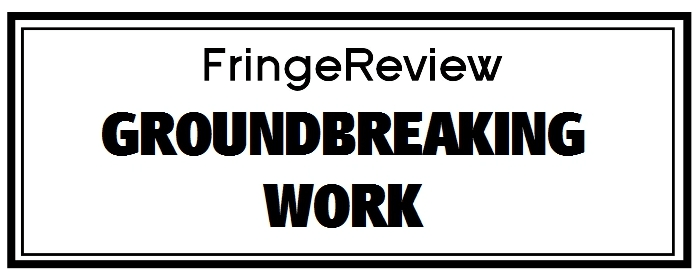FringeReview UK 2022
For Black Boys Who Have Considered Suicide When the Hue Gets Too Heavy
Royal Court Theatre, Boundless Theatre, New Diorama

Genre: Dance and Movement Theatre, Drama, LGBTQ, Mainstream Theatre, New Writing, Physical Theatre, Political, Theatre
Venue: Royal Court Jerwood Downstairs
Festival: FringeReview UK
Low Down
Written and Directed by Ryan Calais Cameron, Co-Director and Original Director Tristan Fynn-Aiduenu, Designer Anna Reid, Lighting Design Rory Beaton, Sound Designer Nicola T. Chang, Movement Director Theophilus G. Bailey-Godson, Musical Director and Vocal Coach John Pfumojena.
Assistant Director Monaé Robinson, Associate Sound designer Jahmiko Marshall, production Dramatherapist Wabriya King, Production Manager Sayeedah Supersad, Stage Manager Marie-Angelique St. Hill, DSM Mica Taylor, ASM Stacey Nurse, Set Built by Royal Court Stage Departments and Ridiculous Solutions.
Till April 30th
Review
There’s more than a welcome return for Ryan Calais Cameron’s For Black Boys Who Have Considered Susicide When the Hue Gets Too Heavy, which premiered last year at the New Diorama, and now plays at the Royal Court Downstairs.
This time co-directed by Cameron with original director Tristan Fynn-Aiduenu, it’s perfected the promise wrought by the same six-strong cast into a miraculous, joyful work shadowed by suicidal feeling.
Inspired by For Colored Girls Who Have Considered Suicide/When the Rainbow is Enuf, that’s the paradox: a narrative for six young actors shadowing death who take six-pack for a literal dance-off.
So Nnabiko Ejimofor’s torso is the first image to rivet attention as Rory Beaton’s lighting slivers and strokes the group in a bravura chiaroscuro at the opening and close. It’s an earnest of dark punched through by light.
The comradely writhe of bodies delivers the obvious, still potent metaphor for group therapy. Intimate discussion, painful reveals: the deaths of fathers who seemed invincible, trashing of fathers because they’re not. Childhood abuse from an unexpected quarter with denials and outfalls, body-count sex, love as anxiety, performative anxiety, badman graduation, academic rejection of all white narrative, virginity, the consequences of staying behind as your imagined enemy bleeds.
Each character’s built on what they deliver: it’s not always what you might expect.
Ejimofor’s Jet centres the group with a sad maturity. His rage at a revered father’s dying isn’t the only thing revealed as towards the end he explains to the man he can’t get with: ‘Being Black is hard enough; being Black and queer can seem a cruel and impossible proposition…. I apologise for leading you into a tango that I won’t be able to materialise.’ Ejimofor’s weight comes with a balletic telling.
There’s Aruna Jalloh’s elegant, detached Obsidian, university-educated rejector of all things white, even white women (a shock to his comrades, a laugh for everyone else), though he’s not above objectifying; as seemingly hapless Pitch points out. A defining moment comes as Obsidian’s involved unwillingly in a knife-fight.’ ’Mother’ is the name for ‘God’ in the hearts and mouths of all children’ concluding: ‘so often suicide becomes blurred with homicide.’
In contrast to Jet, Mark Akintimehin’s Onyx experiences the kicking of his father as his defining moment: leading to ‘Badman’ status. Forever armoured, he ends though concluding with one of the most telling insights; as the group discusses suicidal feeling in the last pages: ‘There’s a line between not wanting to live anymore and wanting to die.’
Emmanuel Akwafo’s gentle, under-achieving Pitch manages to melt everyone’s hearts after taunts of ‘virgin’ by relating meeting how a woman on a train, Chloe, gives him her number. She’s the one woman named. Akwafo’s character coms up from behind to assume emotional authority.
Darragh Hand’s cocky womanising Sable gets the most laughs in his sexual braggadocio as the second half opens, relating what it’s like to be light-skinned. All have fine voices but Hand’s is stratospheric and his fan-base is palpable. Like Pitch later though, there’s a point when ‘body-count’ isn’t enough and falling in love can be terrifying.
Kaine Lawrence’s Midnight is sexualised before his time, at nine. Again there’s a carapace to be broken in, one of being perennially sexualised and unable to attach. His speeches are individual, litanic: ‘I have low-level dread running through my head…. People in complicated yoga positions… looks like a cool place to be but not a place for someone like me.’
First circling round six chairs, the breakout second act allows designer Anna Reid to create a gantry and railings with an echo of the same below, made use of as the six craft narratives and personal testament using upper and lower levels, played on by Beaton’s often pastel lighting.
The whole pulsates with breakings-out as movement director Theophilus G. Bailey-Godson creates routines that interrupt each other, go to full term or shiver into another routine, to the work of music director and vocal coach John Pfumojena.
It’s excitingly projected too. Sound designer Nicola T. Chang ensures it’s punchy but only enough for the audience to throw back cheers, claps and participation as Hand in particular eyes up individuals and turns the bleakness of six young men into a celebration of – for now – coming through. Cathartic is a term too freely thrown about: this work exudes it. It’s a signature and call to fight for the support so many young Black men in particular lack.


















































